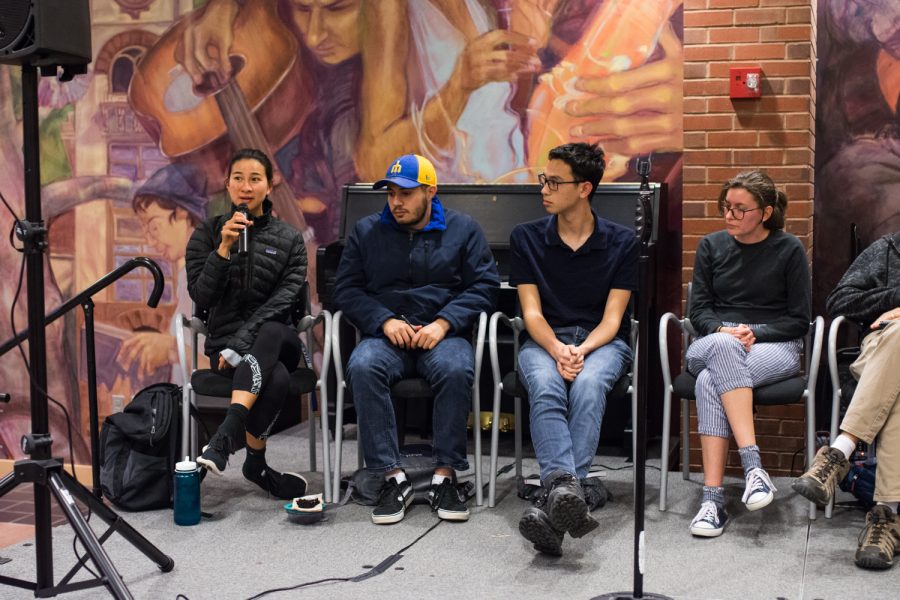Imagining a Revised “Encounters”
April 26, 2018
On Tuesday April 17, ASWC hosted a student forum to discuss the Encounters syllabus, the first-year experience and possible changes thereto. The Encounters program is currently under scrutiny by the General Studies committee following an external review, which was concluded in 2017. As a result, there may be significant changes to the first-year experience in the future. ASWC President Anna-Marie McCorvie directed the meeting, but the discussion was driven primarily by questions and comments from both the panel and from students in the audience. McCorvie prompted the conversation with the question: “What should the first-year experience look like?”
This is a somewhat perplexing question, as the Encounters program is notoriously polarizing amongst the faculty of Whitman. The conversation becomes even more complex when the voices of students are included. Last Tuesday’s forum was an opportunity for students to air and discuss their concerns about Encounters; however, rather than providing clarity surrounding the future of the first-year experience, this forum emphasized, once again, the frustration surrounding the central tension of the Encounters program.
This tension exists over the trade-off between a more standardized syllabus and a more unifying (and, as some believe, more fair) experience for first-years, and a less standardized curriculum which allows each professor to tailor the course to their strengths and provides a greater diversity of perspectives amongst the first-year. Currently, Encounters operates under a standardized syllabus. That said, each professor has license to interpret that syllabus, and determine their own expectations for their class. This issue occupied the majority of the time at the town hall.
The town hall was organized around a panel composed of both students and current faculty and staff who teach Encounters. Staff and Faculty on the panel included Senior Adjunct Instructor of General Studies Timothy Doyle, Language Learning Center Manager Devon Wootten, Professor of Mathematics Albert Schueller and Associate Professor of History Elyse Semerdjian, who recently published an op-ed on the Encounters program. Students present included Ella Meyers ‘21, Ethan Raffman ‘20, Omar Aldahleh ‘20 and Kaitie Dong ‘18.
Several students voiced concerns that differences between the individual sections of Encounters were detrimental to the goals of the course. Student concerns included inconsistent expectations, grades and work loads between sections. Aldahleh expressed frustration at his own experience with inconsistent grading in Encounters, stating that he felt his section was held to a higher standard than others. He also pointed out that the differences in grading are arbitrary, and often unfair to students whose professors demand more work, or grade to a higher standard.
Additionally, some students felt that the lack of consistency prevented the course from achieving its goal of unity between first-year students. Both students and faculty were concerned with the expectation that professors in non-writing based fields should be able to effectively teach the curriculum.
In general, the faculty on the panel were resistant to the idea of a more standardized program. Both Semerdjian and Doyle defended the personal differences of professors, and doubted the efficacy of a standardized syllabus given these differences.
Between the camp pushing for greater standardization, and those doubting it would be possible, Wootten struck a middle ground.
“We should look at this experience as a shared intellectual experience. It’s not a shared methodological experience,” Wootten said. “Communities aren’t homogenous, and if this is a communal experience it’s always going to look different. I want to push back against that idea of conflict between a shared experience and the individual approach to teaching Encounters.”
Professor Scheuller, who sits on the syllabus committee, provided some concrete information about the changes we can expect to see in the next year. He told the audience that the syllabus would be shortened to eight texts per semester, down from eleven and twelve texts in the first and second semesters respectively, and would include a greater diversity of voices.
According to Scheuller, “The syllabus is undergoing probably one of the more radical changes this year that its undergone in many, many years.”
While the syllabus is altered every year, a more significant change may come in the next two years. A total overhaul of the first-year experience is a possibility. Some alternatives include discipline-specific seminars or a series of different seminars taught by professors with different areas of expertise.
Professor Paul Apostolidis, Chair of the General Studies Committee, highlighted some of the most significant debates about the future of the Encounters program. He referenced the 2017 external review of the program, and said, “[The reviewers] didn’t feel that we had agreement about what the goals and purposes of the program were. So we need clarity on that, and they were right.”
To that end, all three divisions of faculty have held meetings in various combinations to clarify the goals of the program. Apostolidis echoed the aforementioned disagreement.
“What’s emerged from the conversations is a split in the faculty,” he said. “Some are proceeding with the idea that they want the common syllabus to continue while others feel quite strongly that we’d be better served if we broke it up.”
Although there is little consensus on how the program might change in the coming years, all of the faculty consulted expressed the importance of a unifying learning experience for first-year students. Apostolidis stated that, “There is a strong sense that whatever course it is, it should be a course with strong substantive coherence.”
Whatever changes may occur, we can be certain that the program will retain some essential elements between each section, and that it will move forward with the goal of unifying Whitman as an academic community. Whether this means more standardization, less standardization, or an entirely different format for the first-year experience remains to be seen.






